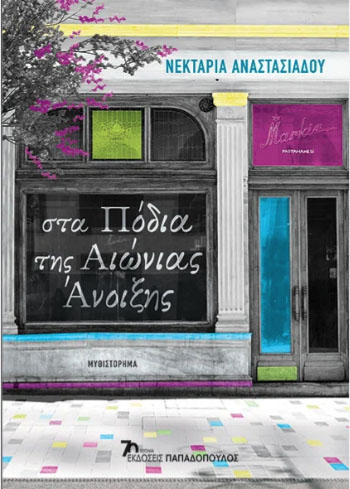I write in the Istanbul dialect of Greek, a language fractured historically by the splays and trenches that arc southward from the Anatolian plate into the Aegean and Ionian seas.
Nektaria Anastasiadou
Istanbul, my city, is perched atop the the North Anatolian Fault, a geological rift that passes just 20 kilometers below us, through the Sea of Marmara. Earthquakes are normal in Turkey and Greece, one of the most seismically active regions in the world.
But I don’t just live on a fault line. I also write on it, in the Istanbul dialect of Greek, a language fractured historically by the splays and trenches that arc southward from the Anatolian plate into the Aegean and Ionian seas. Like its geography, the Greek language is rich with islands, mountains, near deserts, and lush forests that have always been in the eye of pirates, colonizers, and immigrants. The language bears the marks of all who passed through it; yet, with a few exceptions, such as Pontic and Cypriot, most dialects are mutually intelligible. In Ancient Greece, dialectical differences were appreciated and accepted, as shown by Homer’s epics and Nikander’s poems, which are both enriched by various colloquialisms. No intellectual movements were able to shake Greek dialects until the 18th century, when Katharévusa, a pseudo-ancient form of the language semi-purified of Middle Eastern contaminants, was invented to unite all Greek speakers. Katharévusa became the preferred written language of the elite, but fortunately never the vernacular. It was abandoned in 1976 in favor of Standard Modern Greek, which is essentially Atheno-Peloponnesian. This Central Greek, as some linguists call it, made its way into the homes of Greek-speakers everywhere through the television, eroding many dialects and threatening to level the language into something as stark and bare as the rocks of Attica.

Constantinopolitan/Istanbul Greek, called Rumca in Turkish (the language of the Romans/Byzantines) and Polítika in Greek (the language of the Pólis/City) has been spoken in the city for over two thousand years. Although Ottoman Turkish became the official language after the 1453 conquest, with Arabic and Persian also recognized, over fifty minority languages — including Greek, Ladino, and Armenian — were allowed to flourish, as evidenced not only in books, but also in multilingual Ottoman signage, calendars, and even sales receipts. Within this Ottoman linguistic hybrid, Istanbul Greek maintained Byzantine forms now lost from Central Greek, such as the verb μνίσκω/mnísko (to live), the noun χουλιάρι/houliári (spoon), as well as Arabic and Farsi words that entered the Greek language well before the Ottoman conquest, including μπεζεστένι/bezesténi (covered market, from Farsi bazzāzistān) and ακιντές/akidés (a hard candy without a wrapper, from Arabic quandi). The dialect’s main speakers — Orthodox Christians called Rums, meaning Roman, as well as Romaniote Jews — often attended French or Greek schools and had close business relationships with Italians; consequently, we incorporated significant French vocabulary, including whole phrases such as “τρε ζολί και κομιλφό/très jolie [ke] comme il faut” (pretty and proper) and “ακάτρεπεγκλ/à quatres épangles” (well-dressed). We absorbed nearly as much Italian as the Ionian Greek dialects, including τράβαλα/trávala (problems, from travaglio) and ρεγάλο/regálo (gift). Because Rums and Romaniotes lived in the same neighborhoods as Ladino-speaking Jews, we also adopted Ladino words such κομφεταρία/komfetaría (from Ladino konfitería), along with significant vocabulary from Ottoman officialdom and neighbors.
But Istanbul Greek is not only the result of archaisms and borrowing. We also have a natural affinity for language play. Afterall, Constantinople — not Athens — was the center of Greek letters from shortly after its founding in 330CE to the early 20th century. I haven’t met one Istanbul Rum, regardless of age, profession, or education, who doesn’t invent his or her own words. And we still love to mix it up, just as we did in the times of the Byzantine and Ottoman Empires, running through three or four languages in a single sentence.
The first threat to this vibrant dialect came from the intellectuals who promoted Katharévusa in letters and in schools. Not only teachers from the Greek state, but also native Rum teachers who had studied in Athens, attempted to perform linguistic exorcism on schoolchildren. Likewise, from the 1920s to the 1960s, the Vatandaş, Türkçe Konuş! or Citizen, Speak Turkish! campaign empowered ordinary citizens to hound neighbors into abandoning minority languages. In some instances, the campaign even resulted in fines. Although Citizen, Speak Turkish! is long over and one can now speak Greek freely and openly in Istanbul, some people, especially those who married outside the minority, did not teach Greek to their children. Others stopped speaking Greek in public spaces and are hesitant to resume. Nevertheless, the dialect, even if influenced by Central Greek and sometimes eclipsed by Turkish, endures.
Istanbul itself remains an intense source of attraction to the inhabitants of Greece, yet to this day most Greek publishers refuse to publish the Istanbul dialect and, for that matter, any non-Central Greek dialects. The result is that not only Constantinopolitan characters, but also Cretans, Salonikans, Corfiots, and others speak Athenian in Greek novels, creating a fiction scene that is colorless and stilted. You now understand the boldness of my decision to write a novel entirely in Istanbul Greek — no concessions, no footnotes, no glossary. Although I use various techniques such as the addition of synonyms, adjectives, and context to make the story entirely and easily comprehensible to an Athenian, I was told repeatedly by people in the business that a novel in Istanbul Greek would never be published. Despite such opposition, I refused to write in Central Greek, which would result in something as fake as a London novel with Londoner characters speaking Southern American drawl. I vented my frustration by creating an Istanbul Greek Idiom series on Twitter, in which I discuss one Istanbul Greek word or expression and its etymology per day. In 2021, journalist and author Nikos Efstathiou noticed my series and asked me to do an interview for leading Greek newspaper Kathimerini. I responded to his questions in Istanbul Greek, and Kathimerini published my replies as given, without edits: a groundbreaking move. Soon after, Ioannis Papadopoulos, a publisher with Constantinopolitan roots and a progressive outlook, contacted me; in 2023, Papadopoulos released my second novel Στα Πόδια της Αιώνιας Άνοιξης/Beneath the Feet of Eternal Spring, the first book ever to be published entirely in Istanbul Greek. Some reviews have praised the freshness of its voice; others have not even commented on the dialect. The latter is a compliment to Greek readers and critics, who seem to be more ready for diversity than their publishers.
The Ancient Greeks and other Mediterranean civilizations purposely built their settlements along massive fault zones, which are usually accompanied by drinking water, hot springs, protective cliffs, and fertile land depressions. The Temple of Apollo at Delphi, one of the most sacred sites in the Ancient Hellenic world, is located on two faults. Narcotic fumes known as the Breath of Apollo may have entered the temple through the fissures beneath it; when the Pythia oracle inhaled these fumes, she believed that she was in communion with the gods. These fissures were also considered an entrance to the underworld, and earthquakes were transcendent events during which the upper and underworlds opened to each other. Long before modern civilization covered Mediterranean fault lines and splays with high-rise concrete, earthquakes did not cause the devastation that they do today. Toppled temples, houses, and other buildings were simply rebuilt. The problem, therefore, is not the fault line itself, but what we build on them; whether it is something rigid, cumbersome, and inappropriate to the natural topography, or whether it is something flexible, natural, and harmonious with its environment. In my case, writing on the fault line has been just as propitious as the Ancient Greek experience of building on them; it has given my fiction a mystical breath that emerges from the rocks and sea of Istanbul itself. This does not mean that I have had an easy time publishing. On the contrary, I have had to rebuild many times in different languages. But ultimately, I have been able to create something rich and fresh, which I never could have done in a more stable geography.
Nobel-prize winner Isaac Bashevis Singer wrote fiction in Yiddish after the Holocaust, at a time when Yiddish was already faced with extinction. When asked about his choice to write in a small, dying language, he replied, “Not only Yiddish but all languages are constantly in the throes of death and in the terrible effort of being reborn.” I do not believe that Istanbul Greek has ever been in the throes of death; rather its existence has been purposefully ignored and locked away, like an embarrassing old aunt in a nursing home. Central Greek hoped that our dialect — and all Greek dialects for that matter — would be quietly returned to the earth without anyone noticing. But a few of us have been listening to the whisperings of the elderly oracles in our dining rooms, cafés, sea ferries, and community tea halls. We have trained our ears. We have taken notes. We have ensured the rebirth of our dialects, and we will continue rebuilding with them.
*A shorter form of this essay was given as talk for the “Languages on the Fault Lines” panel discussion on September 1, 2023 at the Iowa City Public Library as part of the International Writing Program (IWP) of the University of Iowa, at which Nektaria Anastasiadou was a Writer in Residence.




